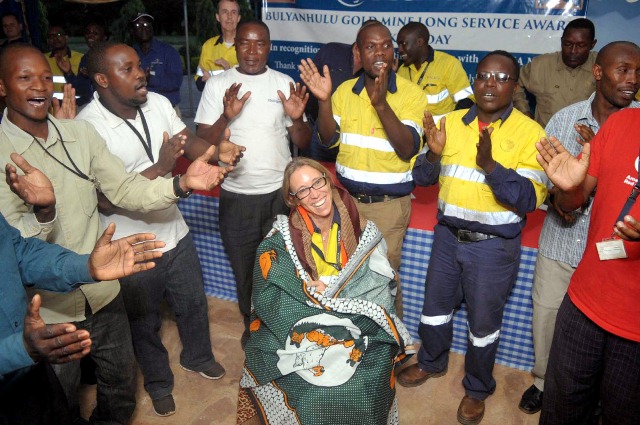A planned increase of restrictions to reduce the number of foreign workers entering Tanzania has brought new worries for some foreigners already in the country. But while controversial, the recently passed Non-Citizens Employment Regulation Bill is not unprecedented in a region feeling the choke of growing inequality.

Workers assemble at Bulyanhulu Gold Mine in Shinyanga region. The mine is one of several ACACIA Gold Mining Corporation mines–formerly the Canadian London listed African Barrick Gold Mining Corp.
By Krishnan Nair.
Tanzania’s parliament [has approved] stringent new employment regulations to curb the number of foreign workers in the country. [As] part of a growing trend in east Africa and beyond, the new rules are intended to create more opportunities for the indigenous population.
On 18 March, the Tanzanian parliament introduced the Non-Citizens Employment Regulation Bill which, according to labour and employment minister Gaudentia Kabaka, will come into effect on 1 July, 2015.
“The new regulations reflect a wider trend towards increasingly stringent local content requirements in Tanzania, and will raise questions over the attractiveness of the country as a destination for foreign direct investment,” says Sarah Collier of global risk firm Verisk Maplecroft.
She expressed concern over the likely 1 July 2015 implementation date: “The speed is likely to amplify challenges for investors and raises wider concerns over the sudden imposition of new regulations.”
In recent decades, Tanzania has pitched itself as a destination of choice for foreign investors, and is in the process of gradually dismantling centralised economic controls that are a legacy of the country’s socialist past.
In 2013, the country boasted $12.7bn in FDI stock and attracted FDI inflows of $1.9bn – far outstripping all other east African nations .
However, in light of the relative scarcity of skilled local workers, the new bill sparks fresh concern for sectors that historically employ foreign workers. Mining, agriculture and road construction will likely be hard hit by the new rules.
“Increased restrictions on hiring foreign employees will pose considerable challenges for investors given persistent shortages of skilled labour across all sectors,” says Ms Collier. She warns that further populist measures could be in the offing as the government prepares to go to the polls in October 2015.

The Principal Medical consultant for ACACIA Gold Mining in Tanzania Dr. Zumbi Elvis Musiba, (R-in glasses), discusses an issue with Director of Commercial services at Bulyanhulu gold mine, Benedict Busunzu during a ceremony April 28, 2015, to award best workers at the gold mine
Under the new bill the Ministry of Labour will become the sole arbiter of foreign worker permits, and will identify those sectors in which expatriates can be employed. Although Ms Kabaka insists the new regulation will see more locals employed in growth sectors, precisely which ones will be subject to this planned cull of foreign-workers remains unclear.

Above: Filbert Rweyemamu, General Manager of Buzwagi Gold Mine greets workers during a ceremony at Bulyanhulu Gold mine to award best workers April 28, 2015. Buzwagi Gold Mine is also an ACACIA mining operation. Below: Janet Reuben-Lukashingo, ACACIA Tanzania Director of Operations greets workers at the ceremony
Nevertheless, apprehensions abound.
“This top-down approach to identifying sectors will certainly restrict innovation, as it requires the ministry to identify – and then actively publish – areas where an expatriate can work. In our case, financial leasing is only now being broadly recognized as catalytic for SME and agricultural finance, five years after we began demonstrating this in Tanzania,” says Coy Buckley, CEO of Equity for Africa, a UK organisation which provides finance to SMEs in Tanzania.
A widening gap
Tanzania avoided the ill fate of more internationalised economies during the post-2009 global recession. The country has since enjoyed moderate growth thanks to increased tourism, an expanding telecommunications market and a better banking system.
However, poverty and youth unemployment remain widespread. The 2014 Global Hunger Index categorises Tanzania’s hunger level as ‘serious’, likely as a result of corruption, poor infrastructure and misuse of natural resources.
These can be the catalysts for snowballing tensions between locals and expatriates. The widening wealth gap between foreign investors and local workers creates an impasse for policymakers.
Strong FDI has supported the country’s growth and improved efficiency over the last decade. Yet resentment is growing within the indigenous population towards the perceived infiltration of Chinese, Kenyan and Ugandan workers into unskilled, semi-skilled and managerial positions.

‘CELEBRATING THE BEST MOTHER IN THE VILLAGE’: Bulyanhulu Goldmine workers chant praises to Michelle Ash (seated draped in Kitenge cloth), the Mine’s General Manager, on April 28, 2015, after awarding her a Best Manager Award to the manager they placed in authority themselves. Photos: ACACIA Gold Mining Corp.
The new regulation reflects a growing anti-China feeling among Tanzania’s policymakers. Conflicting figures make it difficult to estimate the precise number of Chinese workers in Tanzania, but reports claim there were around five hundred Chinese companies operating in the country in 2013. Tanzania’s bill, though controversial, is not unprecedented in a region that is feeling the choke of growing inequality.
In 2012, with a view to seeing more locals in lower skilled employment, Kenya placed heavy restrictions on foreign workers. In 2011, neighbouring Zambia was under pressure to act against Chinese employers who mistreated local workers.
And in South Sudan, proposals in 2014 to replace all foreign workers with locals threw the country’s planned entry into the East African Community (EAC) into serious doubt. The plan, however, was swiftly scrapped.
But while Tanzania’s new regulations look ambitious on paper, the government’s ability to implement all of the reforms on the proposed timeline remains in question.
“Ultimately, the impact of the new act will depend on the ability of government to actually implement it…[and] it remains to be seen how much of an impact the new rules will have on actual practice,” says Mr Buckley. This article was lifted from This is Africa. Graphics have been added by TZ Business News.




